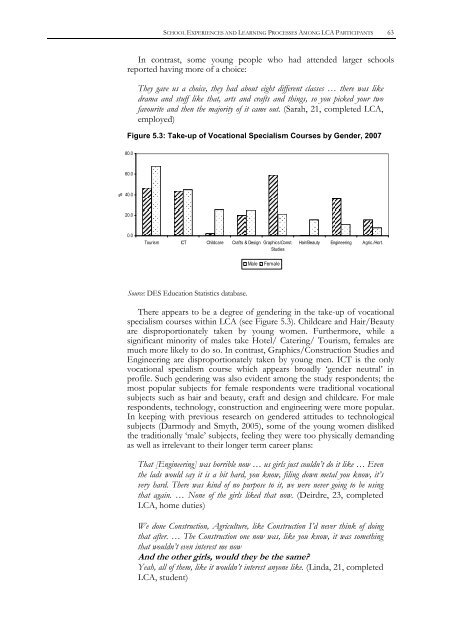Student Experiences of the Leaving Certificate Applied Programme
Student Experiences of the Leaving Certificate Applied Programme
Student Experiences of the Leaving Certificate Applied Programme
You also want an ePaper? Increase the reach of your titles
YUMPU automatically turns print PDFs into web optimized ePapers that Google loves.
SCHOOL EXPERIENCES AND LEARNING PROCESSES AMONG LCA PARTICIPANTS 63In contrast, some young people who had attended larger schoolsreported having more <strong>of</strong> a choice:They gave us a choice, <strong>the</strong>y had about eight different classes … <strong>the</strong>re was likedrama and stuff like that, arts and crafts and things, so you picked your tw<strong>of</strong>avourite and <strong>the</strong>n <strong>the</strong> majority <strong>of</strong> it came out. (Sarah, 21, completed LCA,employed)Figure 5.3: Take-up <strong>of</strong> Vocational Specialism Courses by Gender, 200780.060.0%40.020.00.0Tourism ICT Childcare Crafts & Design Graphics/Const.StudiesHair/Beauty Engineering Agric./Hort.MaleFemaleSource: DES Education Statistics database.There appears to be a degree <strong>of</strong> gendering in <strong>the</strong> take-up <strong>of</strong> vocationalspecialism courses within LCA (see Figure 5.3). Childcare and Hair/Beautyare disproportionately taken by young women. Fur<strong>the</strong>rmore, while asignificant minority <strong>of</strong> males take Hotel/ Catering/ Tourism, females aremuch more likely to do so. In contrast, Graphics/Construction Studies andEngineering are disproportionately taken by young men. ICT is <strong>the</strong> onlyvocational specialism course which appears broadly ‘gender neutral’ inpr<strong>of</strong>ile. Such gendering was also evident among <strong>the</strong> study respondents; <strong>the</strong>most popular subjects for female respondents were traditional vocationalsubjects such as hair and beauty, craft and design and childcare. For malerespondents, technology, construction and engineering were more popular.In keeping with previous research on gendered attitudes to technologicalsubjects (Darmody and Smyth, 2005), some <strong>of</strong> <strong>the</strong> young women disliked<strong>the</strong> traditionally ‘male’ subjects, feeling <strong>the</strong>y were too physically demandingas well as irrelevant to <strong>the</strong>ir longer term career plans:That [Engineering] was horrible now … us girls just couldn’t do it like … Even<strong>the</strong> lads would say it is a bit hard, you know, filing down metal you know, it’svery hard. There was kind <strong>of</strong> no purpose to it, we were never going to be usingthat again. … None <strong>of</strong> <strong>the</strong> girls liked that now. (Deirdre, 23, completedLCA, home duties)We done Construction, Agriculture, like Construction I’d never think <strong>of</strong> doingthat after. … The Construction one now was, like you know, it was somethingthat wouldn’t even interest me nowAnd <strong>the</strong> o<strong>the</strong>r girls, would <strong>the</strong>y be <strong>the</strong> same?Yeah, all <strong>of</strong> <strong>the</strong>m, like it wouldn’t interest anyone like. (Linda, 21, completedLCA, student)

















